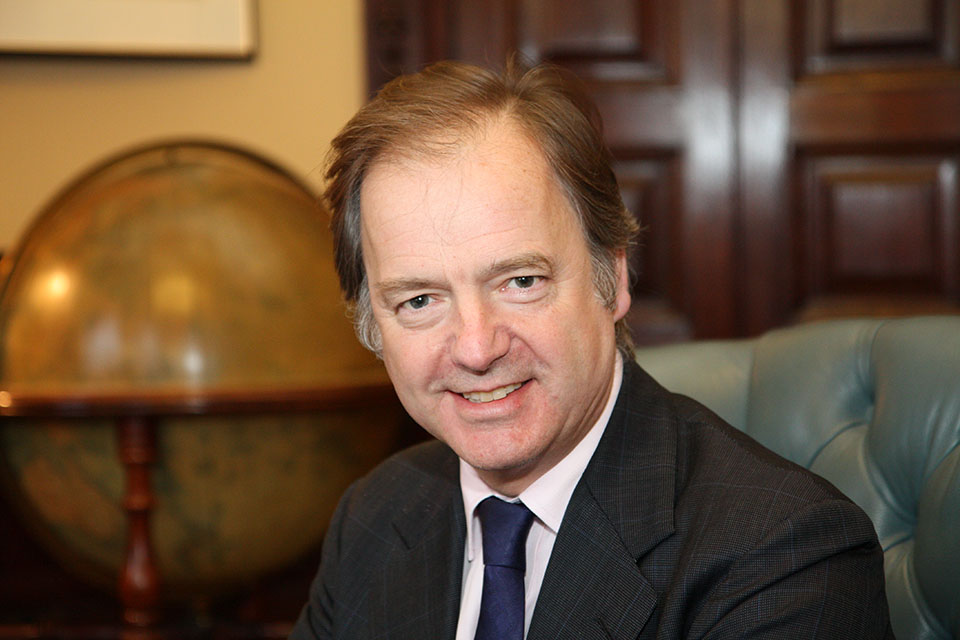Hugo Swire's speech at Brazilian Embassy Amazon Day
Minister of State for Latin America, Hugo Swire, addressed attendees at the Brazilian Embassy on Amazon day 2015.

Ladies and gentleman. Thank you, Ambassador Dos Santos, for your kind introductory remarks. I would like to take this opportunity to welcome Minister Teixeira, Minister Levy and Mr Coutinho to London, and thank them for choosing to mark Amazon Day with us in the United Kingdom.
Indeed, it is a pleasure to join you on Amazon Day - and to talk about an issue so important to both our countries: Climate Change.
But, let me start off by stating the obvious and saying that Brazil is valued partner for the United Kingdom.
And this week is the perfect example, with the first ever UK-Brazil Economic and Financial Dialogue, and the sixth annual Joint Economic and Trade Committee (JETCO) taking place here in London. This will be an important opportunity for Ministers Levy and Monteiro to discuss our economic cooperation and trade, with the Chancellor and Business Secretary.
Now, I have had the pleasure, as Minister of State, of visiting Brazil three times in as many years, most recently to open our new post in Belo Horizonte last month - and I never fail to be impressed by its character and vibrancy.
And like the UK, it is a country with football in its DNA – the most successful team in World Cup history. However, I would urge Brazilians to remember that they owe every ounce of this success to my local team – Exeter City – who they faced in their first ever international match 101 years ago.
Thanks to the efforts of Minister Teixeira - and the impressive administration of Brazil’s environmental policy - Brazil is also a world leader on climate change and tackling deforestation.
Remarkably, Brazil has reduced over 85% of its forestry emissions over the last decade - and cut Amazon deforestation rates by 82% over the same period.
These achievements - and Brazil’s recently announced “Intended Nationally Determined Contribution” of 37% emissions reductions by 2025 - makes it one of the most ambitious developing countries on climate change.
But tackling deforestation and cutting emissions is not without its challenges.
As Britain’s own experience with the UK Climate Act - which aims to reduce our emissions by 80% by 2050 - has shown us, it is no easy task.
Success requires a concerted effort across government. But above all, it requires finance - both public and private.
So, I am pleased that a recent visit by Deputy Environment Minister, Mr. Gaetani, has enabled us to share our experiences on innovative policy and financial instruments that provide the targeted support that businesses need. And I hope we will strengthen this collaboration further.
Because, put simply, we cannot afford not to. If we are to truly address the global climate challenge we all face, it is vital that our governments do everything we can to channel private investment into low carbon technologies, forests and agriculture.
That is why the Prime Minister announced at the UN General Assembly last month that we would increase our International Climate Fund to nearly £6 billion from 2016 to 2021, to support the poorest and most vulnerable countries in their transition towards a low carbon economy and to adapt to the impacts of climate change.
Funding from the UK on a range of forestry programmes is also supporting countries build capacity and put in place the changes required to tackle deforestation - not least, land-sector reform; addressing governance and illegal logging; and supporting community engagement.
So, our work together in these areas is setting an important example in the run-up to the Climate Change Conference in Paris, a month from now.
It is our shared strengths; our growing partnership on green finance, science and innovation; and our common desire to tackle the global threat of climate change that makes the UK-Brazil relationship so important for security and prosperity around the world.
And long may that continue.